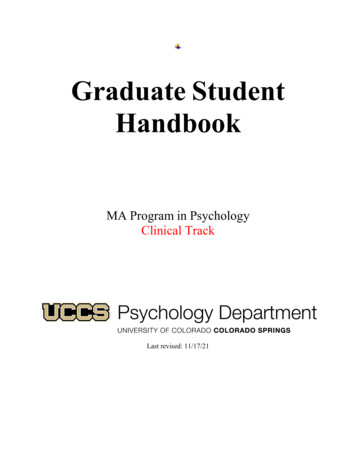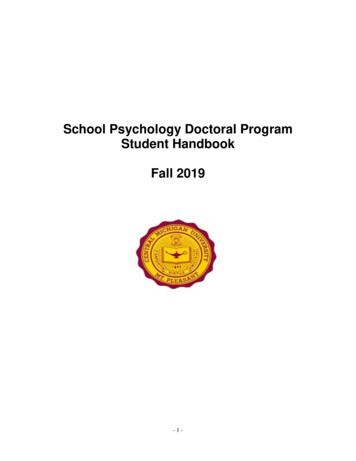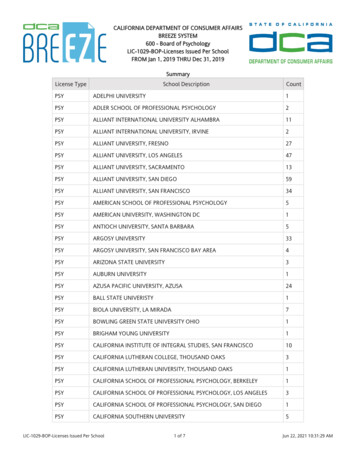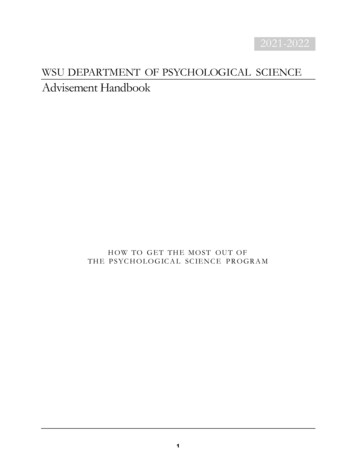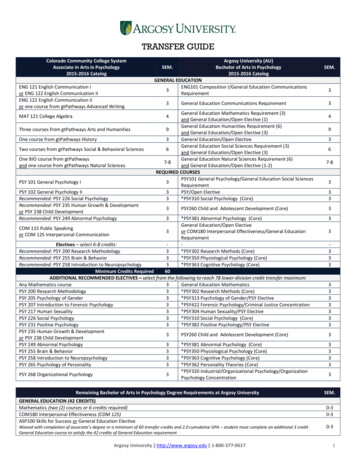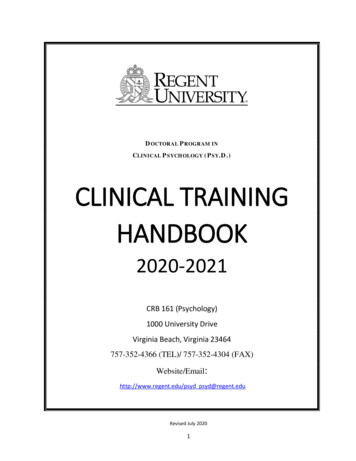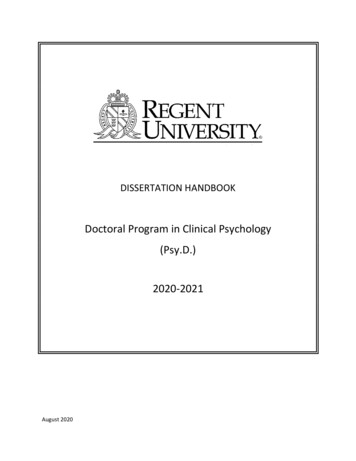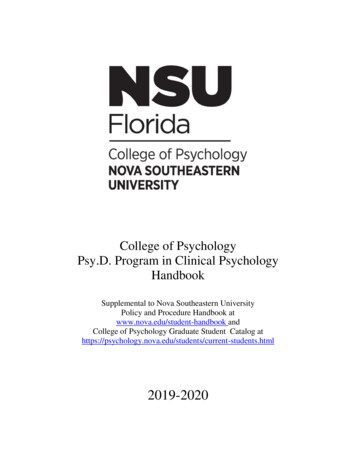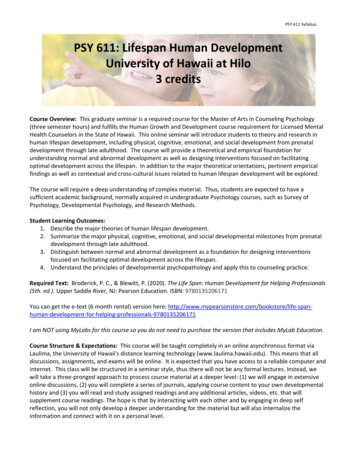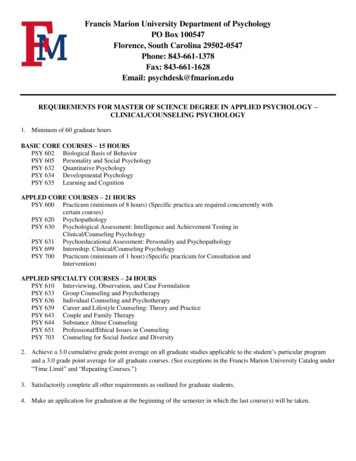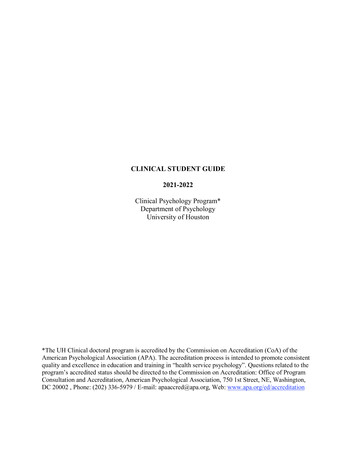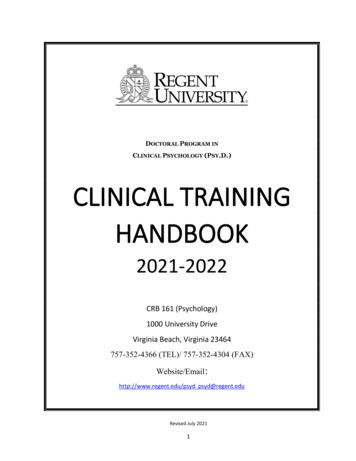
Transcription
DOCTORAL PROGRAM INCLINICAL PSYCHOLOGY (PSY.D.)CLINICAL TRAININGHANDBOOK2021-2022CRB 161 (Psychology)1000 University DriveVirginia Beach, Virginia 23464757-352-4366 (TEL)/ 757-352-4304 (FAX)Website/Email:http://www.regent.edu/psyd psyd@regent.eduRevised July 20211
IMPORTANT NOTE: Handbooks are updated each year. Students must adhere to thecurrent academic year’s handbook for all program requirements with the exception ofrequirements for programs progression outlined in the University Catalog.Significant updates in this revision of the handbook:-Page 7 – The required sequence of practica is further explainedPage 53 – The requirements for ‘non-matched’ internship students is further clarifiedPage 65 – The length of Advanced Practica is specifiedPage 91 – The total points for the Personality Assessment Probe increasedPage 125 – Directions for the IRPP have been updatedPage 144 – Format of practica contract updated to include telesupervisionPage 13, 78, 79 – Intelligence Testing Probe pass rate percentage changed from 95%to 90%Page 165 – Format of APE approval form updated to include telesupervisionPage 178 – APPI updated to 2021 formatRevised July 20212
TABLE OF CONTENTSRegent Clinical Training Philosophy Introduction . 6Definitions . 7Clinical Competence . 8Sequential Clinical Training Objectives . 13First Year – Pre-Practicum. 13Second & Third Year – Intensive Practicum Sequence . 14Fourth Year – Advanced Practicum Sequence – (PSY 739 & 741; Transition to Leadership Rolesin Clinical Practice): . 15Clinical Probes . 16Course Based Formative Probes: . 16Psychological Services Center Based Probes: . 17Course BAsed Summative Probes: . 18Non-Course Based Summative Probes: . 18Acquiring & Showing Competense: Mileposts & Roadblocks . 19Program Outcome Mileposts & Roadblocks for Specific Competencies . 20Pre-Practicum . 35Intensive Practicum Sequence (psy 733-738) . 35Clinical Practica Intensive Sequence Overview. 35Practica Grading . 36Practica Clinical Activities. 36Intensive Practica Sequence Requirements. 37Practica Selection . 42The Practica Contract . 44Advanced Clinical Training Sequence . 45Fifth Year Pre-Internship Training . 46External Employment in Clinical Positions . 47Pre-Doctoral Internship . 49Requesting Approval to Pursue an Internship: . 49Applying to an Internship Site:. 50The APPIC Matching Process: . 51DPCP Requirements: . 52The Internship Contract: . 55Revised July 20213
Intern Evaluation Forms:. 55Failing Internship: . 55International Student Issues: . 55Professional Practice Insurance: . 56Rights and Responsibilities . 56Doctoral Students . 56Faculty Practica Instructor . 57Site Supervisor . 58Checklist of Student Practica Requirements . 59Clinical Training Progression Tracking Sheet . 61Liability Insurance . 62Disability Accomodations Policy . 62Appendices for Clinical Training Handbook . 66Appendix A: Probe Scoring Rubrics . 67Clinical Interviewing Probe: Video recording evaluation. 68Psychopathology Probe . 76Intelligence Testing Probe . 78Personality Assessment Probe . 89Treatment Planning Probe . 91Case Presentation Probe . 94Psychotherapeutics Probe . 98Diversity Probe . 101Integration Probe . 109Integrated Assessment Probe . 112Advanced Case Presentation Probe . 118Advanced Assessment Report Writing Probe . 121Internship Readiness Portfolio Probe . 124Appendix B: INITIAL PRACTICA FORMS . 136PRE-PRACTICUM ACTIVITIES . 137Psy.D. PRACTICUM SITE REQUEST FORM . 138EXAMPLE PRACTICA SITE LIST . 140DOCTORAL PRACTICA CONTRACT . 143STUDENT ETHICAL AGREEMENT . 145Revised July 20214
WAIVER OF LIABILITY. 146Part-Time Practicum Placement Request . 147Appendix C: Time2Track Information . 148PRACTICA STUDENT EVALUATION ADMINISTERED VIA TIME2TRACK: . 149Time2Track Activities List. 154Guidelines for Submitting Pre-Practica Activities in Time2Track . 157Appendix D: Student Forms . 161ADVANCED PROFESSIONAL EXPERIENCE CONTRACT . 165Psy.D. Student External Work Approval Form . 167Appendix E: Internship Forms . 169Request for Clearance to Apply for Pre-Doctoral Internship . 170Psy.D. Program Criteria for Designed Internship . 172Student Internship Training Evaluation Form . 177Sample APPIC Application . 179Appendix F: Clinical Progression Remediation Form . 1844Clinical Progression Remediation Plan. 1855Revised July 20215
REGENT CLINICAL TRAINING PHILOSOPHY INTRODUCTIONThis handbook gives an overview of the clinical skills, practica requirements, procedures, andopportunities available to students in the Doctoral Program in Clinical Psychology (DPCP) atRegent University. This document is adjunct to other Regent University DPCP materials. Allstudents are responsible for reading and becoming familiar with the clinical skill and fieldexperience requirements of the doctoral program. This document is subject to ongoing reviewand revisions and students will receive updates as issued.The DPCP is designed to provide students with a coordinated, progressive and logical sequenceof clinical training facilitating their development as emerging professionals. The trainingprogression is aimed at fostering specific clinical competencies. A number of thesecompetencies are achieved in the context of formal coursework. Many others are developedthrough carefully supervised clinical experiences. The clinical training sequence is a plannedcourse of study incorporating didactic and supervised experiential training. The first two yearsof training occur on campus. During the third and fourth year, the student is typically placedin an off-campus training environment. The pre-doctoral practica sequence affords varied,progressive training opportunities in multiple settings. Practica training is facilitated byintensive supervision provided at training sites combined with secondary “practica” seminarsinstructed by Regent faculty. While site supervisors retain primary responsibility for thestudent’s supervision, the practica seminars extend this training with consultative supervisionand facilitate extensive exploration of integration issues.Because of the practitioner-scholar model adopted by the doctoral program, a substantialamount of students’ time will be spent applying/ refining psychological knowledge and skillsin clinical contexts. The DPCP is designed to produce competent practitioners of clinicalpsychology who are poised to continually enhance their practice with ongoing developmentsin the field. Although the DPCP does not attempt to produce professionals who functionprimarily as researcher-scientists, our students are equipped to function as ‘local clinicalscientists’ who are capable of providing training, supervision and leadership in their practicecontexts. This training model has a number of implications for the clinical competenciesstudents must develop. These are discussed in detail in section two.A key distinctive of the DPCP at Regent University is the fact that all instruction occurs withinthe broad outlines of a Christian worldview. While Regent is not affiliated with any specificdenomination or sect, it is committed to an evangelical Christian worldview. This broadcommitment affords a great deal of variety in both faculty and student approaches toacademic development. Our faculty and staff represent a wide range of Christiandenominations. The DPCP’s Christian commitment brings with it additional implications forclinical training. First, the religious context is viewed as a ‘value-added’ component of clinicalRevised July 20216
training. Students do not receive a weakened or compromised professional training becauseof the religious component of the program. Rather a key element of the Christian worldviewis the view of vocation as avocation. Since our careers are viewed as service contexts or‘callings’ emerging from our more general spiritual commitments, an emphasis on ‘excellence’ensues. Second, students are expected to become proficient in working with issues of religiousdiversity. Ethical and respectful approaches to working with client religious diversity areincorporated throughout the program. Finally, students are required to develop skills in theintegration of psychology and Christianity. Although the DPCP does not mandate a specificapproach to integration, students are expected to integrate Christian perspectives, practicesor techniques in a professionally competent manner.DEFINITIONS The pre-internship practica experience is a minimum of 1600 hours duration. Thepractica training starts during the first year of the program with the pre-practicum sequence.Students begin by accumulating closely mentored supervised experience in clinical lab courses(interviewing, the basic assessment courses) and through observation activities. Students willtypically accumulate a minimum of 100 hours of initial clinical experience during the first year.The intensive clinical practica sequence starts in the second year and runs continuously for sixsemesters (Fall, Spring, Summer). A total of 600 hours of supervised clinical experience peryear must be acquired during the second and third year of the program. Students mustmaintain satisfactory progress in the accompanying seminar (Psy 733-738) each practicasemester. During the fourth year, students complete the advanced practicum sequence.During the fall, they complete a clinical lab in conjunction with the Supervision andConsultation course (Psy 763). Students will accrue approximately 8 hours of experience insupervising beginning practica students, another 3 hours in a consultation project, as well asan advanced practica placement consisting of a minimum of 8 hours weekly. The preinternship practica culminates in an Advanced Practica seminar during the fourth year (Psy739 & 741). The consultation project is completed in PSY 741. As graduate training isdevelopmental and sequential, each practica series must be completed in order (Psy 733 –735, Psy 736 – 738, and Psy 739 – 741). If a student takes a break from practica training aftera sequence has begun or fails one of the practica courses, the entire practica sequence wouldbe repeated. A Faculty Practica Instructor provides consultation and oversight at the University level asthe instructor for Clinical Practica class. Ordinarily, the faculty supervisor is not privy toidentifying information about clients seen by students at their practica sites. Consequently,the site supervisor retains primary responsibility for student supervision. The practicainstructor monitors student skill development throughout the practica year and conveysinformation about this to the Director of Clinical Training. The Site Supervisor provides over-all supervision at the practica site and may delegateother site personnel to work with the student. The site supervisor will typically be a licensedclinical psychologist. However, there may be situations when supervision by another mentalRevised July 20217
1)2)3)4)health professional is necessary for a portion of the students training. Such arrangements areacceptable providing the following conditions are met:The student does not perform services that are outside of the mental health professionals’regulated scope of practice (e.g., performing psychological testing under the supervision of apsychiatrist).The student is obtaining supervised clinical experience in an area contained within the scopeof practice for health service psychology.The supervisor must be a licensed mental health professional, or under the supervision ofsuch a supervisor.The supervised training from a non-psychologist should be a small portion of the student’soverall training.The Director of Clinical Training (DCT) has responsibility and authority for thecontinued development, implementation, and oversight of the clinical training sequence inthe DPCP as delegated by the Psy.D. Program Director. The DCT maintains information aboutstudent clinical skill development, reflected through practica evaluations, clinical probes, andclinical remediations when needed. The DCT is a liaison with practica and internship agencies,consulting with agencies to develop training programs for students. Other duties includeapproving students’ practica and internship arrangements, serving as a consultant to studentsand faculty on practica and internship matters, maintaining practica and internshipinformation resources, developing and disseminating all policies and procedures that apply topractica and internships, and interpreting/applying those policies to specific cases. The DCT isassisted by the External Practica Coordinator (Dr. Jones) in the development and maintenanceof practica training contracts.CLINICAL COMPETENCEOver the course of the DPCP, the student’s status gradually shifts from that of a student tothat of an emerging professional. This transition is marked at Regent by the demonstration ofa number of specific clinical competencies that are consistent with the Profession WideCompetencies identified by the American Psychological Association’s Committee onAccreditation. Assessment occurs at formative and summative levels. The assessment criteriafor each of these competencies fall into the following categories:Outcome Indicators:1. Practica Supervisor Evaluations of Student: Eight semester ratings by practicasupervisors on the Practica Student Evaluation Form, final ratings of 3 or better(3 expected level of competency).2. Faculty Mentor Ratings: Faculty Mentor ratings indicating competency is present onthe Request for Clearance to Apply for Pre-doctoral Internship form.3. Dissertation Research: Student successfully completes a dissertation project andpresents the findings.Revised July 20218
4. Academic Performance: Passing performance in relevant courses.5. Clinical Probes: Successful performance on relevant clinical probes.6. Annual Review: Satisfactory standing at annual review.A. Research: Demonstrates appropriate knowledge, skills, and attitudes to produce anddisseminate scientific research and to make appropriate use of scientific methods and findingsin all professional roles. Demonstrate the substantially independent ability to formulate research orother scholarly activities (e.g., critical literature reviews, dissertation, efficacystudies, clinical case studies, theoretical papers, program evaluation projects,program development projects) that are of sufficient quality and rigor to havethe potential to contribute to the scientific, psychological, or professionalknowledge base. Conduct research or other scholarly activities. Critically evaluate and disseminate research or other scholarly activity viaprofessional publication and presentation at the local (including the hostinstitution), regional, or national level.Outcome Indicators: 3, 4B. Ethical and Legal Standards: Demonstrates appropriate ethical and legal knowledge, skills,and attitudes in all professional roles. Be knowledgeable of and act in accordance with each of the following:o The current version of the APA Ethical Principles of Psychologists andCode of Conduct;o Relevant laws, regulations, rules, and policies governing health servicepsychology at the organizational, local, state, regional, and federal levels;o Relevant professional standards and guidelines. Recognize ethical dilemmas as they arise, and apply ethical decision-makingprocesses in order to resolve the dilemmas. Conduct self in an ethical manner in all professional activities.Outcome Indicators: 1, 2, 4, 5, 6C.Individual and Cultural Diversity: Demonstrates appropriate knowledge, skills, andattitudes about cultural and individual differences in all professional roles. An understanding of how their own personal/cultural history, attitudes, andbiases may affect how they understand and interact with people different fromRevised July 20219
themselves. Knowledge of the current theoretical and empirical knowledge base as it relatesto addressing diversity in all professional activities including research, training,supervision/consultation, and service. The ability to integrate awareness and knowledge of individual and culturaldifferences in the conduct of professional roles (e.g., research, services, and otherprofessional activities). This includes the ability apply a framework for workingeffectively with areas of individual and cultural diversity not previouslyencountered over the course of their careers. Also included is the ability to workeffectively with individuals whose group membership, demographiccharacteristics, or worldviews create conflict with their own. Demonstrate the requisite knowledge base, ability to articulate an approach toworking effectively with diverse individuals and groups, and apply this approacheffectively in their professional work.Outcome Indicators: 1, 3, 5D. Professional Values, Attitudes, and Behaviors: Demonstrates dispositions and engages inbehaviors that reflect the values and attitudes of the psychology profession, in all professionalroles. Behave in ways that reflect the values and attitudes of psychology, includingintegrity, deportment, professional identity, accountability, lifelong learning, andconcern for the welfare of others. Engage in self-reflection regarding one’s personal and professional functioning;engage in activities to maintain and improve performance, well-being, andprofessional effectiveness. Actively seek and demonstrate openness and responsiveness to feedback andsupervision. Respond professionally in increasingly complex situations with a greater degreeof independence as they progress across levels of training.Outcome Indicators: 1, 2, 4, 5E.Communication and Interpersonal Skills: Demonstrates ability to communicateeffectively, to interact appropriately, and to develop meaningful and helpful relationships inall professional roles. Develop and maintain effective relationships with a wide range of individuals,including colleagues, communities, organizations, supervisors, supervisees, andRevised July 202110
those receiving professional services. Produce and comprehend oral, nonverbal, and written communications that areinformative and well-integrated; demonstrate a thorough grasp of professionallanguage and concepts. Demonstrate effective interpersonal skills and the ability to manage difficultcommunication well.Outcome Indicators: 1, 4, 5F.Assessment: Demonstrates appropriate knowledge, skills, and attitudes in the selection,administration and interpretation of assessments consistent with the best scientific researchevidence and relevant expert guidance. Demonstrate current knowledge of diagnostic classification systems, functionaland dysfunctional behaviors, including consideration of client strengths andpsychopathology. Demonstrate understanding of human behavior within its context. Demonstrate the ability to apply the knowledge of functional and dysfunctionalbehaviors including context to the assessment or diagnostic process. Select and apply assessment methods that draw from the best availableempirical literature and that reflect the science of measurement andpsychometrics; collect relevant data using multiple sources and methodsappropriate to the identified goals and questions of the assessment as well asrelevant diversity characteristics of the service recipient. Interpret assessment results, following current research and professionalstandards and guidelines, to inform case conceptualization, classification, andrecommendations, while guarding against decision-making biases, distinguishingthe aspects of assessment that are subjective from those that are objective. Communicate orally and in written documents the findings and implications ofthe assessment in an accurate and effective manner sensitive to a range ofaudiences.Outcome Indicators: 1, 4, 5G.Intervention: Demonstrates appropriate knowledge, skills, and attitudes in theselection, implementation and evaluation of interventions that are based on the best scientificresearch evidence; respectful of clients’ values/preferences; and relevant expert guidance.Revised July 202111
Establish and maintain effective relationships with the recipients of psychologicalservices. Develop evidence-based intervention plans specific to the service delivery goals. Implement interventions informed by the current scientific literature,assessment findings, diversity characteristics, and contextual variables. Demonstrate the ability to apply the relevant research literature to clinicaldecision making. Modify and adapt evidence-based approaches effectively when a clear evidencebase is lacking. Evaluate intervention effectiveness, and adapt intervention goals and methodsconsistent with ongoing evaluation.Outcome Indicators: 1, 4, 5H. Supervision: Demonstrates appropriate knowledge, skills, and attitudes regarding theinstruction and oversight of trainees and other professionals. Demonstrate knowledge of supervision models and practices. Demonstrate knowledge of supervision ethics.Outcome Indicators: 1, 4I. Consultation and Interprofessional/Interdisciplinary Skills: Demonstrates appropriateknowledge, skills, and attitudes regarding interprofessional and interdisciplinarycollaboration in relevant professional roles. Demonstrate knowledge and respect for the roles and perspectives of otherprofessions. Demonstrates knowledge of consultation models and practices.Outcome Indicators: 1, 4, 5J. Integration: Understand the integration of psychology and a Christian worldview. Address religious/spiritual problems. Engage psychology from a Christian worldview.Outcome Indicators: 1, 4, 5Revised July 202112
SEQUENTIAL CLINICAL TRAINING OBJECTIVESThe clinical training experiences provided by the DPCP consist of a planned, progressive andcumulative training sequence. The components of these experiences are discussed in greaterdetail in subsequent sections. The sequence of training is designed to move students throughthe following skill development progression:FIRST YEAR – PRE-PRACTICUMYear 1: Establishment of Basic Clinical Skills: During the first year the student completes thebasic clinical skills courses and key classes in the assessment sequence. Through acombination of coursework, didactics, and approximately 50 hours of lab work students willgain a variety of foundational skills for the delivery of services. The hours engaged in prepractica activities outside of class should be entered into Time2Track, so that the studentmay begin to accumulate clinical training hours. Details on the activities to be completed, aswell as the method for entering these activities in Time2Track can be found in Appendices Band C. Students will attain the following clinical skills by the end of their first year in theDPCP: Conducting a competent clinical interviewOutcome Assessment: Clinical Interv
Regent University. This document is adjunct to other Regent University DPCP materials. All students are responsible for reading and becoming familiar with the clinical skill and field experience requirements of the doctoral program. This document is subject to ongoing review and revisions and students will receive updates as issued.
